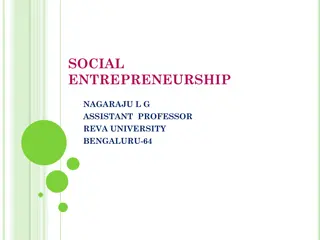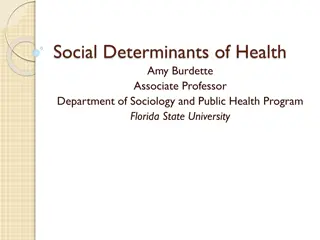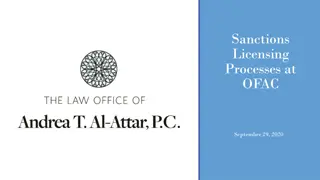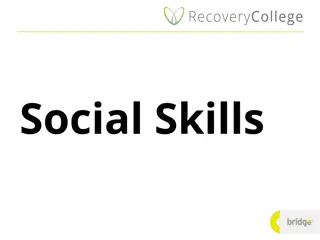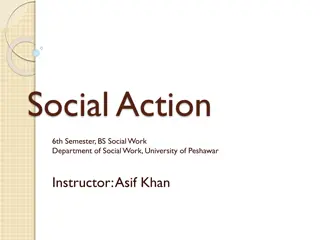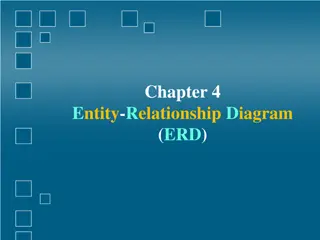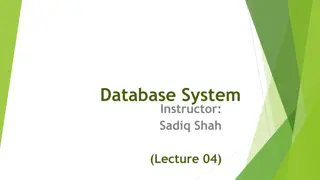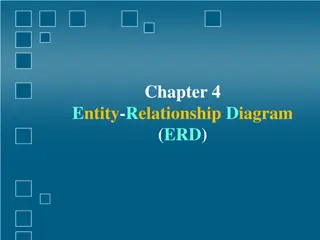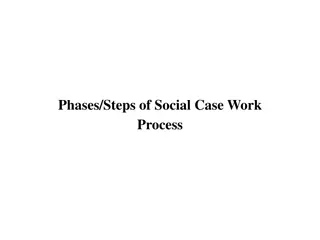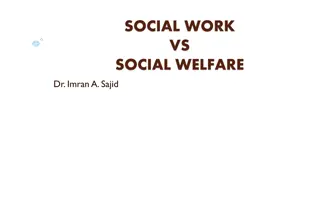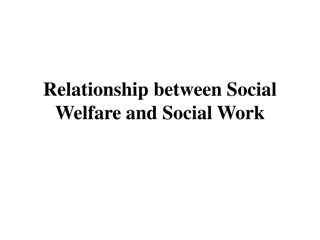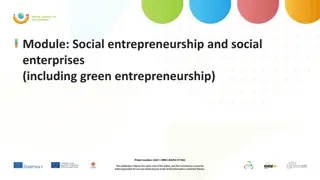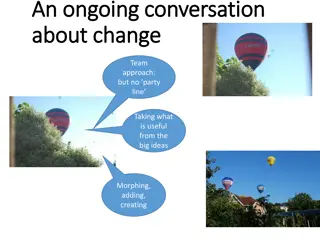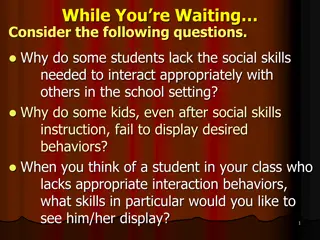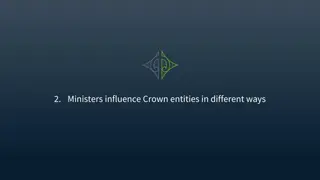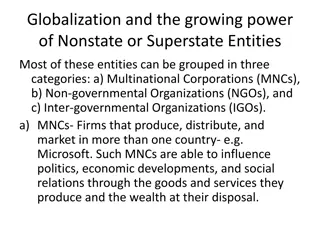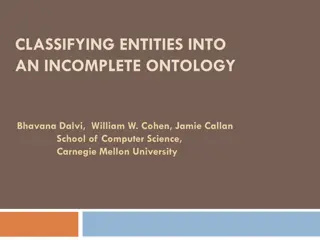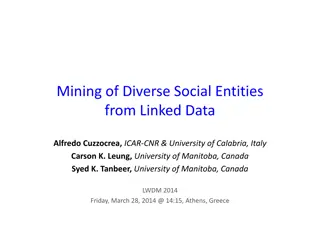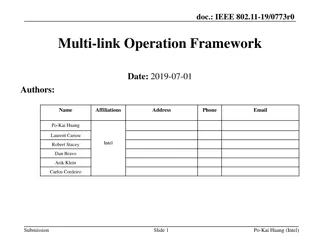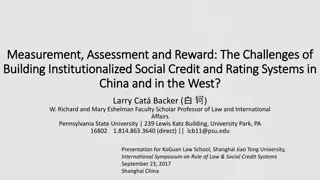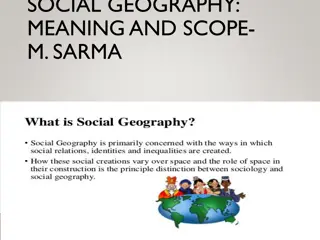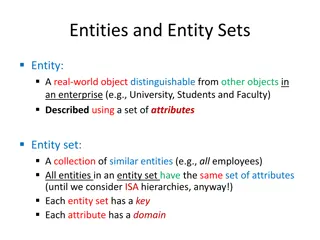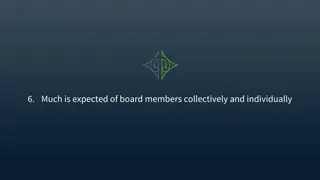ECC Social Value Reporting and Evaluation Framework
Essex County Council (ECC) has implemented a robust Social Value Reporting and Evaluation framework based on the Local Government Association's National TOMs method. This framework categorizes and assesses social value contributions in two parts - Value Score and Supporting Statement Score - to deri
3 views • 16 slides
Promoting Private Sector Engagement in Local Governance through PPPs in Zambia
This presentation outlines the promotion of private sector engagement in local governance in Zambia through Public-Private Partnerships (PPPs). It covers the legal and institutional frameworks, processes, sub-national level PPP projects, current initiatives, lessons learned, and conclusions. The ove
2 views • 23 slides
Understanding Social Entrepreneurship, Social Enterprise, and Social Innovation
Social entrepreneurship involves creating sustainable social impact, social enterprises address challenges in critical needs sectors, and social innovation focuses on developing effective solutions to social and environmental issues. These concepts emphasize creating social value while engaging with
2 views • 19 slides
Understanding Social Determinants of Health
Chronic conditions like heart disease and cancer have multiple causes, not all biological. Social epidemiology studies the social distribution of health, morbidity, and mortality risk influenced by social status and conditions. Factors such as age, gender, race, socioeconomic status, and social cond
0 views • 32 slides
Sanctions Licensing Processes at OFAC Overview
The Office of Foreign Assets Control (OFAC) administers U.S. economic sanctions against targeted foreign entities. This overview covers OFAC's jurisdiction, licensing authorities, application processes, and tips for interacting with OFAC. Compliance with U.S. primary sanctions is crucial, especially
0 views • 32 slides
Anti-Poverty Practice Framework for Social Work in Northern Ireland
This framework emphasizes the importance of addressing poverty in social work practice in Northern Ireland. It aims to help social workers recognize and respond to the impact of poverty on individuals, families, and communities. Poverty is identified as a major social injustice, and social work prof
2 views • 13 slides
Understanding the Importance of Social Skills for Mental Health Recovery
Social skills play a crucial role in how we communicate, interact, and form relationships with others. They are essential for personal, social, and professional success. Neglecting social skills can hinder mental health recovery, as they contribute to social recognition, acceptance, and building soc
3 views • 12 slides
Understanding Medical Social Work and Its Impact on Patient Well-being
Medical Social Work, also known as Health Care Social Work, plays a crucial role in addressing the social, physical, and psychological needs of patients. Through providing case work, after-care, and convalescence services, Medical Social Workers contribute to reducing hospital readmissions, preventi
0 views • 12 slides
Understanding the Concept of Social Action in Professional Social Work
Social action is a crucial method in professional social work that involves organized efforts to bring about structural changes in society or prevent adverse changes. It addresses social problems like the dowry system, environmental destruction, and health issues through mobilizing masses for impact
1 views • 22 slides
Understanding Entity-Relationship Diagrams (ERD) for Database Design
Entity-Relationship Diagrams (ERD) are vital in database design, illustrating entities and their relationships. They help in conceptualizing data models and laying the groundwork for database structures. The process involves identifying entities, defining relationships, and analyzing interactions to
0 views • 40 slides
Understanding Modeling Entities and Attributes in Database Systems
Entities, relationships, and attributes are fundamental constructs in the Entity-Relationship (E-R) model. Entities represent people, places, objects, events, or concepts in a user environment. Each entity type has a set of attributes defining its properties. It is crucial to distinguish between ent
2 views • 17 slides
Understanding the Texas Tort Claims Act for State Agencies
The Texas Tort Claims Act (TTCA) outlines the scope of tort liability for State entities and employees during their state employment. State entities are represented by the Office of the Attorney General, and specific provisions apply to state entities separate from municipalities. This overview cove
0 views • 16 slides
Objectives and Importance of Social Legislation for Social Workers
Social legislation is inspired by the constitution and aims to remove discrimination, safeguard rights of vulnerable groups, and eradicate social evils. It plays a crucial role in social welfare by providing a legal basis for addressing societal issues, enhancing community well-being, and facilitati
0 views • 4 slides
Overview of Social Security and Health Care System in Turkey
The social security system in Turkey comprises three main organizations: Social Insurance Institution (SGK/SSK), Social Security Institution for the Self-employed (Bag-Kur/SISE), and Pension Fund for Civil Servants (Emekli Sandigi). Hospitals in Turkey are dispersed among various social security and
8 views • 42 slides
Understanding Entity-Relationship Diagrams (ERD)
An Entity-Relationship Diagram (ERD) is a vital data modeling technique for visualizing an information system's entities and their relationships. This graphical representation helps in database design by defining entities, analyzing interactions, and determining cardinality. Entities represent real-
1 views • 40 slides
Phases and Steps of Social Case Work Process
Social case work process involves three main phases: Social Study, Social Diagnosis, and Social Treatment. The Social Study phase focuses on acquiring facts about the client's situation, while Social Diagnosis involves the professional opinion of the case worker towards a solution. Social Treatment
1 views • 7 slides
Understanding the Difference Between Social Work and Social Welfare
Social work and social welfare are often used interchangeably, but there are distinct differences between the two. Social work involves highly trained professionals providing services to individuals and communities in need, using problem-solving methods. On the other hand, social welfare focuses on
0 views • 9 slides
Understanding the Relationship Between Social Welfare and Social Work
Social welfare and social work are interconnected concepts aimed at enhancing societal well-being. Social welfare refers to a nation's system of programs and services meeting essential needs, while social work involves professional activities supporting individuals and communities in achieving socia
1 views • 6 slides
Understanding Social Entrepreneurship and Social Enterprises
Social entrepreneurship involves individuals known as social entrepreneurs who focus on addressing social, cultural, or environmental issues without the sole aim of making profits. These enterprises operate with the goal of creating a social impact rather than prioritizing financial gain. Social ent
1 views • 18 slides
Discussion on Temporal Entities and Simultaneity in CIDOC CRM Meeting
Temporal entities and the modeling of simultaneity in CIDOC CRM are under discussion at the upcoming meeting. The current approach considers the cardinality of certain relations, aiming to streamline the representation of time-spans and spacetime volumes. The evolving perspectives on the spatial com
3 views • 5 slides
Social Change and Care Practices: Challenges and Solutions
Exploring the challenges within care practices, this article delves into the need for a shift towards person-centered approaches, highlighting issues such as abuse, frustration, and bureaucratic hurdles. It discusses the "Justice for LB" campaign and the importance of understanding and reshaping soc
0 views • 17 slides
Insights into Social Economy and Social Dialogue Research Outcomes
Research outcomes from the Mesmer+ project at HIVA KU Leuven reveal misalignments in social dialogue inclusiveness, challenges faced by social economy entities, and the role of employers in the social economy. Recommendations include enhancing the role of social economy employers and promoting inclu
1 views • 7 slides
Social Economy and Innovation in Emilia-Romagna Region
Emilia-Romagna Region in Italy highlights the importance of social economy and innovation for sustainable development. Various initiatives such as Social Cooperatives and Voluntary Associations contribute to the region's social well-being. The focus on social values and not-for-profit activities dri
2 views • 15 slides
Understanding Social Skills Development in Students
Explore the reasons behind students lacking social skills in school settings and analyze the challenges some face even after receiving social skills instruction. Discover the key social skills required for appropriate interactions and the importance of social competence for overall well-being. Delve
0 views • 64 slides
Social Enterprise Development Toolkit Module 4: Unlocking Philanthropic Capital
This module focused on unlocking philanthropic capital for social enterprises, featuring expert speaker Usha Menon who works extensively with non-profit organizations across Asia. The session showcased various participating social enterprises and discussed scenarios, solutions, and a case study on H
1 views • 20 slides
Ministers' Influence on Crown Entities through Strategic Processes
Ministers influence Crown entities by appointing effective boards, engaging in dialogue, participating in strategic planning, and ensuring continuous improvement. They make appointments, hold meetings, receive regular performance reports, and guide entities in setting strategic directions. Through f
0 views • 11 slides
Globalization and the Influence of Nonstate Entities
Globalization is shaped by the power of Multinational Corporations (MNCs), Non-governmental Organizations (NGOs), Inter-governmental Organizations (IGOs), and technological advancements. These entities wield influence on politics, economics, and social dynamics globally. The authority and legitimacy
0 views • 4 slides
Accounting Standards for Non-Corporate Entities Overview
Introduction to accounting standards for non-corporate entities such as partnerships, LLPs, trusts, and nonprofits. Explanation of the applicability of accounting standards based on business size and the classification of Level I, II, III, and IV entities by ICAI. Details of the ICAI announcement da
0 views • 14 slides
Understanding Social Neuroscience: Exploring Human Sociality and Well-Being
Social neuroscience delves into how the brain processes social interactions and their impact on human well-being. It focuses on the interconnectedness between social connections and overall life satisfaction, suggesting that humans are inherently social beings with a strong need for social belonging
3 views • 21 slides
Social Entrepreneurship and Social Inclusion in Bulgaria
The development and implementation of social entrepreneurship practices in Bulgaria aim to promote social inclusion through the development of the social economy. The focus is on combining economic results with social objectives, managed transparently with measurable, positive financial value. Vario
2 views • 12 slides
Classifying Entities into an Incomplete Ontology: Exploratory EM Approach
The research discusses methods for hierarchical classification of entities into incomplete ontologies. It explores the challenges of evolving web-scale datasets and the need for classifying entities in an incomplete ontology structure. The Hierarchical Exploratory EM model is detailed, providing ins
0 views • 27 slides
Diverse Social Entities Mining from Linked Data in Social Networks
This research focuses on mining diverse social entities from linked data in social networks using a DF-tree structure and DF-growth mining algorithm. The study explores the extraction of important linked data in social networks and the mining of various social entities such as friends. Prominence va
0 views • 13 slides
IEEE 802.11-19/0773r0 Multi-link Operation Framework Summary
The document discusses the multi-link operation framework for IEEE 802.11-19/0773r0, focusing on load balancing and aggregation use cases. It introduces terminology related to multi-link logical entities and provides examples of multi-link AP and non-AP logical entities. The framework considers stee
0 views • 16 slides
Challenges of Building Social Credit Systems in China and the West
The presentation by Larry Cat Backer explores the challenges of constructing institutionalized social credit and rating systems in China and the West. It delves into the intricacies of measuring, assessing, and rewarding individuals and entities based on criteria like governmental sincerity, commerc
0 views • 19 slides
Understanding Social Geography: Meaning, Scope, and Differences
Social geography is a branch of human geography focusing on social structures, groups, and activities. It examines the spatial arrangement of social phenomena, social differences, and patterns in understanding socially defined population groups. The scope of social geography includes analyzing spati
0 views • 25 slides
Comparison of Observable Entities in CRM and CRMSci
In this content, different aspects of observable entities in CRM and CRMSci are discussed, including measurements, assignments, simplifications, and adjustments. The evolution and implications of observable entities within these frameworks are explored through various dimensions and properties, shed
0 views • 7 slides
Requirements for Managing Entities in Health Systems
Grant agreements and payments of federal and state financial assistance require compliance with specific statutory authorities. Managing entities must follow guidelines for reporting and reconciling funds, with a focus on transparency and accountability. Providers are required to complete specific s
0 views • 15 slides
Understanding Entities and Relationships in Database Design
Explore the concepts of entities, entity sets, attributes, key attributes, single-valued and multi-valued attributes, derived attributes, as well as relationships and relationship sets in the context of database design. Gain insights into distinguishing between regular entities, weak entities, and e
0 views • 24 slides
FASAB Update: The Federal Reporting Entity Proposal
Discussions on the Federal Accounting Standards Advisory Board (FASAB) update regarding the reporting model, including proposals for the General Purpose Federal Financial Reports (GPFFR) and the distinction between consolidation entities and disclosure entities. The presentation covers principles of
0 views • 31 slides
Expectations and Responsibilities of Board Members in Statutory Entities
Board members of statutory entities are collectively expected to ensure consistent and effective entity performance, financial responsibility, and collaboration. Individually, they must act with integrity, comply with legislation, and avoid conflicts of interest. Boards have a crucial role in monito
0 views • 5 slides


